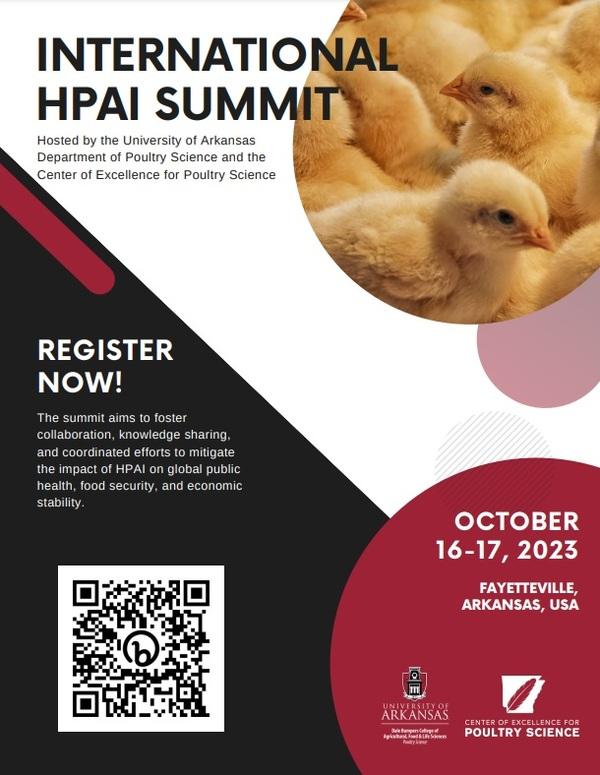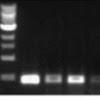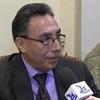Meet the speakers for the First International Avian Influenza Summit (October 16-17, 2023)
Published: August 11, 2023
Source : https://internationalavianinfluenzasummit.uada.edu/

The first International Avian Influenza Summit will be a hybrid event hosted in Fayetteville, Arkansas, USA on October 16-17, 2023.
Meet some of the speakers that will appear in this event:
Alberto Torres, PhD
"HPAI Considerations for vaccination from a Primary Breeder’s perspective”
Alberto Torres holds a Veterinary degree from UNAM (Mexico), a MSc in animal science from Massey University (New Zealand), and a PhD in poultry science from the University of Arkansas (USA). Since 2006, he has managed the exports of breeding stock from the US to all regions of the world where intensive poultry production is practiced. He participates in multiple committees and organizations that address aspects related to poultry health and international trade. In his talk, Alberto will share his views about the potential implications to international commerce of breeding stock and poultry products due to vaccination against HPAI, and also offer thoughts on the scope of vaccination approaches.
Dr. Alice Green
"Risk Factors for Introduction of H5N1 HPAI onto Commercial Table Egg Farms in the United States, 2022: A Case-Control Study"
Alice Green has an MS in Epidemiology and a DVM from Colorado State University. She began her professional career with the USDA Animal and Plant Health Inspection Service (USDA-APHIS) Center for Epidemiology and Animal Health (CEAH) focusing on antimicrobial use and resistance work. From 2010 to 2018, she coordinated foodborne outbreak investigations for USDA’s Food Safety and Inspection Service. From 2018-2020, she served as a Food Safety Officer with the Food and Agriculture Organization of the United Nations. In 2020, Dr. Green returned to CEAH and joined an Incident Management Team, where she collaborated to provide epidemiologic support to state agriculture departments experiencing HPAI in commercial poultry and egg production. This work helped spur the development of a case-control study focusing on risk factors for HPAI in commercial table egg production.
Alejandro Monteagudo Cuevas
"Influenza Aviar en la avicultura mexicana, enseñanzas y aprendizajes."
Doctor Alejandro Monteagudo Cuevas, PhD, MS, Law Licenced. Worked in modern agricultural biotechnology industry and served as AgroBIO Mexico’s Executive President. Currently serves as Executive President of the National Aviation Union in Mexico. Has negotiated for Mexico and the private sector in regional, multilateral, and global forums on international trade, environment, and sustainable development, including the UN Program for the Environment, the UN Commission on Sustainable Development, Codex Alimentarius, and the Organization of the United Nations.
Alvaro González Rubio
"Outbreak IAAP H5N1 in Chile 2022 – 2023: Epidemiology and Control"
Alvaro Gonzalez Rubio, DVM, MSc, is a domestic and wild birds epidemiology in the Agricultural and Livestock Service (SAG) in Chile since 2006. He has extensive experience in epidemiology, especially in working respiratory viruses such as the avian influenza virus and bacteria like Salmonella and Mycoplasma. He is also a professor assistant in the Santo Tomas University and assessor of the National Federation of Poultry Farmers of Colombia since 2013. He has participated in several missions on avian influenza in different countries for FAO, IICA and the World Bank.
He is the coordinator of the National Network for Surveillance and Control Disease in Poultry in the Agricultural and Livestock Service (SAG) in Chile since 2006, which monitors the presence of exotic and endemic pathogens in the poultry production, backyard, and wild birds with funding from the funded by the Ministry of Agricultura. He has collaborated in several publications of scientific and popular articles, has given numerous lectures and interviews for his work on virology.
Daniel R. Perez
“The emergence of poultry adapted H9 subtype avian influenza viruses”
Influenza viruses are pathogens of great significance to public and animal health. Dr. Perez studies the changes that allow influenza viruses to jump animal species and cause disease in humans. Dr. Perez’s long-term goal is to provide a comprehensive map of molecular changes associated with animal-to-human (A2H) and human-to-human (H2H) transmission of influenza viruses. Such information is crucial to better prepare against influenza viruses with zoonotic potential and/or of pandemic concern. Dr. Perez’s laboratory uses a wide range of in vitro and in vivo approaches to better understand influenza virus host range and improve existing and/or develop new universal vaccines and antivirals. Dr. Perez is a faculty member of the Department of Population Health, College of Veterinary Medicine at the University of Georgia. Dr. Perez is a Georgia Research Alliance Distinguished Investigator and Caswell S Eidson Chair in Poultry Medicine within the Poultry Research and Diagnostic Center and affiliated with the Center for Vaccines and Immunology and the Animal Health Resource Center at the University of Georgia.
Darrell R. Kapczynski
"Control Strategies for 2.3.4.4 Highly Pathogenic Avian Influenza Virus-From Vaccines to Host Disease Resistance."
Darrell R. Kapczynski is a Research Microbiologist at the USDA-US National Poultry Research Laboratory in Athens, Georgia. He received his Masters of Sciences and Ph.D. from the Department of Medical Microbiology at The University of Georgia. His research priorities/expertise include the following: Development of vaccines for protection against highly pathogenic avian influenza viruses. Comparative immunology studies of avian species to determine variations in protective host defense mechanisms to avian influenza virus infections. Determining the innate and adaptive immune response to influenza virus in different avian species and determining the contribution of host genetics on protection. Developing transgenic approaches to genetically modify birds to enhance disease resistance. Ecology and evolution of highly pathogenic avian influenza viruses. And more recently, in vitro animal models for SARS-CoV-2 susceptibility. He currently serves in the Exotic and Emerging Avian Viral Diseases Research Unit at USDA.
Gary Flory
"New Developments in Animal Mortality Management during Disease Outbreaks"
Gary founded G.A. Flory Consulting LLC, a global consulting firm, to help clients with a range of services including animal disease and natural disaster response, agricultural emergency planning, research, and emergency response training. Gary has conducted training, given presentations, and deployed on animal disease outbreaks to a number of countries including Timor Leste, the Dominican Republic, Brazil, Vietnam, Tunisia, Korea, Cambodia, Laos, Malaysia, and Azerbaijan. He supports many organizations including the United States Department of Agriculture, the Pan American Health Organization (PAHO), the Food and Agriculture Organization of the United Nations (FAO), and the World Organization for Animal Health (WOAH). Gary currently serves on FAO’s African Swine Fever Global Pool of Expertise. In addition to numerous other articles, reports, and guidance documents, Gary was an author of FAO’s Carcass management guidelines – Effective disposal of animal carcasses and contaminated materials on small to medium-sized farms and USDA’s Catastrophic Livestock Composting Protocol and Mortality Composting Protocol for Avian Influenza Infected Flocks. He was awarded the Agency Star award by the Governor of Virginia for his community service and leadership. One of his greatest passions is traveling to new places and meeting friendly people.
Guillermo Tellez-Isaias
"Quorum Sensing and Avian Influenza Virus: Insights into Viral Pathogenesis and Potential Therapeutic Targets"
He received his Doctor in Veterinary Medicine degree in 1986 and his Master in Science degree in Veterinary Sciences in 1989 from the National Autonomous University of Mexico (UNAM), and his Ph.D. from Texas A & M University. He worked as full Professor at UNAM for 16 years, 8 as head of the Avian Medicine Department at the College of Veterinary Medicine-UNAM. Tellez was President of the National Poultry Science Association or Mexico during 1997-1998; is member of the Mexican Veterinary Academy and the achieved level 3 of the Mexican National Research System in 2002. In 2001, Tellez worked during his sabbatical as Visiting Scientist at the Center of Excellence in Poultry Science of the University of Arkansas, where is still working as Research Professor. His research is focused on the advantages of the poultry gastrointestinal model to evaluate the beneficial effects of functional foods to enhance intestinal health and disease resistance.
Helena Lage Ferreira
"Avian Influenza Virus in wild birds from Brazil."
Helena Lage Ferreira, DVM, PhD, is a Professor at the University y of São Paulo and is currently the Acting President of the Brazilian Society of Virology (SBV), an organization dedicated to the promotion and dissemination of research in virology in Brazil. She has extensive experience in virology, especially in studying respiratory viruses such as the avian influenza virus. She was also an assistant researcher at the “Veterinary Agrochemical Research Centre,” a reference laboratory for the diagnosis of Avian Influenza in the European Union, Brussels-Belgium, and visiting researcher at SEPRL, Agricultural Research Service of the United States Department of Agriculture (ARS- USDA). She is one of the coordinators of the National Network for Surveillance of Viruses in Wild Animals PREVIR, which monitors the presence of pathogens in the Brazilian fauna with funding from the funded by the Ministry of Science, Technology, and Innovation. She has several publications of scientific articles and dissemination, has given numerous lectures and interviews, and has received awards for his work on virology.
Inkar Castellanos Huerta
"New strategies for developing vaccines against the H5N1 avian influenza virus."
Inkar Castellanos Huerta, DVM, Ph.D., is a Postdoctoral fellow at the University of Arkansas and professor of virology at the Autonomous University of Queretaro In Mexico; He has actively participated in the poultry industry in Mexico as Research Director of two important companies, particularly in the area of vaccine development against major viral diseases such as influenza and Newcastle disease, participating in their design and performance evaluation of these products at the field level, with extensive experience in molecular genetics for the expression of recombinant proteins and the molecular study of the avian influenza virus genome. He has participated in the publication in scientific journals and participates nationally and internationally in congresses. He has participated in the publication of scientific journals in various areas and national and international conferences throughout his professional career.
Josh Payne
"Mortality Composting of 2022 HPAI Infected Broilers, Pullets, and Turkeys: Successes and Challenges."
Dr. Josh Payne serves as the Technical Services Director for Poultry Guard®. He was previously an assistant professor and Extension Poultry Specialist at Oklahoma State University. Dr. Payne received a B.S. in Agriculture from Arkansas State University; a M.S. in Poultry Science from the University of Arkansas and a Ph.D. in Poultry and Animal Science from North Carolina State University. Josh has extensive academic, research and industry experience in litter management and poultry mortality management. Dr. Payne has directed mass mortality composting efforts on over 30 avian influenza affected farms and has given multiple presentations to industry, state agency and federal agency representatives regarding his experiences.
Julianna Lenoch
"Avian Influenza in Wild birds and Mammals in the United States"
Dr. Julianna Lenoch is a veterinary epidemiologist for USDA APHIS. Dr. Lenoch is the National Coordinator for Wildlife Services National Wildlife Disease Program. She completed her Doctorate of Veterinary Medicine from Colorado State University and earned a Master of Public Health Epidemiology from the Colorado School of Public Health. Dr. Lenoch is a boarded diplomat of the American College of Veterinary Preventive Medicine. She has been with USDA since 2016, serving multiple roles at the Wildlife-Livestock interface and working in disease control and investigation programs. Dr. Lenoch works at the forefront of disease investigations, working to support APHIS and across the agency in complex outbreaks. Recent projects and investigations include Avian Influenza, Chronic Wasting Disease, African Swine Fever, SARS-CoV-2, Rabbit hemorrhagic disease virus 2, virulent Newcastle disease and other emerging and zoonotic disease events. She is also a member of the USDA National Incident Management team and serves as Deputy Incident commander. Dr. Lenoch is also the World Organisation for Animal Health National Focal Point for Wildlife for the United States.
Maria Eliana Icochea D’Arrigo
“Experiences in Peru for surveillance in the fight against highly pathogenic H5N1 avian influenza”
Eliana Icochea DVM, PhD is a Professor at the Universidad Nacional Mayor de San Marcos, in Lima, Peru. She is currently the head of the Avian Pathology laboratory at the Universidad Nacional Mayor de San Marcos Responsible for the Second Specialty Program and the Master’s Degree in Poultry Farming at the Faculty of Veterinary Medicine of the University of San Marcos. Also is a Technical Adviser of the Pathology and Diagnostic Laboratory, of Certifications of Peru (private laboratory). She is dedicated to the Diagnosis of diseases of domestic and wild birds; Teaching in pathology, diagnosis, treatment, prevention and control of diseases in birds and Development of research projects in Pathology and Poultry Production with emphasis on Newcastle disease and Avian Influenza. She has several scientific publications and presentations as a speaker at national and international conferences.
Miguel Ángel J. Márquez Ruiz
"Current Situation of Highly Pathogenic Avian Influenza by Subtype A/H5N1 in Mexico and in the World"
Graduated as MVZ from the National School of Veterinary Medicine and Zootechnics of the UNAM. 1964. Specialty in Viral Diseases of Birds. University of Liverpool. England. 1969. Master of Veterinary Sciences. Ecole Nationale Veterinaire d’Alfort. Paris France. 1972-1974. Subject Professor of the Department of Medicine and Animal Husbandry of FMVZ/UNAM since 1982. Diplomate American College of Poultry Veterinarians. Baltimore, Maryland. 1998. Doctorate in History. (cum laude). University of Leon. Leon, Spain. 2001-2006. Currently International Consultant in Avian Medicine in Mexico and Latin America.
Mike McGrew
“Genome editing to investigate avian influenza resistance in chickens”
Professor Mike McGrew is a researcher at the Roslin Institute, part of the Royal Dick School of Veterinary Studies at the University of Edinburgh, United Kingdom. Dr McGrew earned a Bachelor of Science degree from the University of Minnesota and a PhD in Biochemistry from Boston University Medical School. He carried out postdoctoral training at the IBDM, Marseille France and at the Roslin Institute. The McGrew laboratory works on a type of stem cell, the germ cell, which produces the sperm and eggs of birds. The McGrew laboratory is developing methods to engineer precise changes into the genome of chicken and to store breeds of chickens using primordial germ cells. Studies using the chicken have made very significant contributions to understanding the development of vertebrates owing to the ease in manipulating the chicken embryo. The chick model system has become even more useful with the sequencing of the chicken genome and development of a robust method for transgenesis in the chicken. It was also shown that migratory primordial germ cells from the chicken could be cultured in vitro for extended periods and used to generate transgenic chickens. My laboratory works on a type of stem cell in birds, the primordial germ cell, which is lineage restricted to producing spermatozoa and eggs of birds. These cells can be used to generate genome edited chickens, chicken which contain precise genetic changes in their genome. We have previously demonstrated that chicken primordial germ cells can be efficiently modified in vitro using transposable elements. I will discuss our use of new CRISPR/Cas9 vector to efficient edit single nucleotides in primordial germ cells and the use of sterile surrogate chicken hosts to increase germline transmission rates and decrease the time needed for production of genome edited chicken. I will describe our efforts to investigate genetic changes important for suseptability and resistance to avian influenza in poultry.
Morgan Farnell
"Microbial Evaluation of Poultry Farm Pathogen Interventions to Improve Biosecurity"
Dr. Farnell was raised on a beef cattle farm in Redwater, TX and Hope, AR. He obtained a B.S. in Agri-Business from Southern Arkansas University and worked for Tyson Foods (Broken Bow, OK) as a processing plant supervisor directing ~150 employees. He acquired a M.S. in Poultry Science concentrating on pre-harvest food safety and a Ph.D. in Veterinary Microbiology focusing on avian immunology at Texas A&M University/USDA-ARS-SPARC. Farnell completed post docs with the Institute for Animal Health and the USDA-ARS-PPPSRU where he researched chicken dendritic cells and Campylobacter interventions. He was a Poultry Extension Specialist with Texas A&M and Mississippi State University for 11 years focusing on biosecurity, cleaning and disinfection, euthanasia, mass depopulation and reportable disease/disaster response. He returned to the TAMU Poultry Science Department in 2016, where he serves as an associate professor with research, teaching, and extension appointments. He has recently refocused his efforts on antimicrobial resistance and antibiotic alternatives to improve food safety and gut health. He currently teaches graduate immunology, undergraduate advanced food bacteriology and international poultry production (Mexico study abroad).
Ramiro Hernan Delgado Franco
“What awaits us in the next bird migration?”
Veterinary Doctor and Zootechnician from the University of Tolima, in Ibague – Colombia in 1988. Since graduation he has worked as Veterinarian-Supervisor of Chicken and Layer farms. He is currently the Technical Director of the Nutriavicola Company, in the Valle del Cauca and Tolima region, in the Central-Western part of Colombia, which produces table eggs for the Colombian market. Member of AMEVEA – Colombia, of the WVPA, and advisory member of the National Technical Committee of Fenavi -Colombia, Member of the regional Sanitary Committee of Fenavi -valle del Cauca. He has published different articles in magazines of the Poultry Sector, as well as given conferences in different international forums.
Susano Medina Jaramillo
"Biosecurity in poultry a point of view."
Zootechnical Veterinary Doctor at UNAM 1970-1974. Avian pathologist with 49 years of professional experience in poultry farming, in the areas of commercial posture, parent stock and broiler breeders, incubation, broiler chicken, training projects, and implementation of health and biosecurity programs, administrative projects, marketing projects, and planning. strategic. He is a counselor of the National Poultry Farmers Union, for the State of Chiapas, president of the National Agrifood Certification Agency and President of the Poultry Farmers Association of Villaflores, Chiapas and Founding Member of the Mexican Society for the History of Veterinary Medicine and Zootechnics.
Dr. Victoria Fields
"Risk Factors for Introduction of H5N1 HPAI onto Commercial Turkey Farms in the United States, 2022: A Case-Control Study"
Victoria Fields has a DVM from Cummings School of Veterinary Medicine at Tufts University and an MPH from University of Massachusetts Amherst. She served as a Peace Corps environmental conservation volunteer in Panama. She started her professional career as a small animal intern and then as an emergency veterinarian in Colorado. She was then an Epidemic Intelligence Service Officer at the Centers for Disease Control and Prevention from 2018-2020, with a focus on applied epidemiology in topic areas including autism spectrum disorder and other developmental disabilities, the COVID-19 response, and Polio response in Zambia. Following completion of EIS, Dr. Fields joined the USDA Animal and Plant Health Inspection Service (USDA-APHIS) Center for Epidemiology and Animal Health (CEAH) National Animal Health Monitoring System (NAHMS) unit, where she has worked on national study analyses and the NAHMS Bison 2022 Study. Currently, she is the NAHMS poultry specialist and has focused on the case-control study looking at risk factors for HPAI in turkey production, the NAHMS Backyard Animal Keeping 2024 Study and is starting to plan a future NAHMS Poultry Study.
Take a look at the venue, the Don Tyson Center for Agricultural Sciences: https://aaes.uada.edu/venue-rental/don-tyson-center-for-agricultural-sciences/.
Source
https://internationalavianinfluenzasummit.uada.edu/Related topics:
Mentioned in this news release:
Cobb-Vantress
USDA - United States Department of Agriculture
Unión Nacional de Avicultores - México
Servicio Agrícola y Ganadero (SAG Chile)
USDA - United States Department of Agriculture
University of Arkansas (USA)
USP -Universidade de São Paulo
University of Arkansas (USA)
USDA - United States Department of Agriculture
Roslin Institute
Texas A&M University
Nutriavicola
Buenaventura Grupo Pecuario
Universidad Nacional Mayor de San Marcos (Perú)
Show more
Recommend
Comment
Share
20 de agosto de 2023
Please have a look at your email (gtellez@uark.edu). I am waiting for your response.
Recommend
Reply
17 de agosto de 2023
HPAI is a worldwide problem. Is there any possibility to replace (substitue/shift) HPAI viruses (for example H5 or H7 subtypes) with a LPAI virus in migrated wild birds or in HPAIV reserovoirs?. Do you thing the virus is stronger than us that shifts easily from LPAIV to HPAIV subtypes? When we (poultry veterinarian) are going to find solution to AI in wildlife birds?
Recommend
Reply
30 de agosto de 2023
Hello!
How many many doses HPAI vaccine needed during growing of layers and or breeders and even revaccination during production ?
Kind regards
Oumed
Recommend
Reply

Would you like to discuss another topic? Create a new post to engage with experts in the community.





















.jpg&w=3840&q=75)